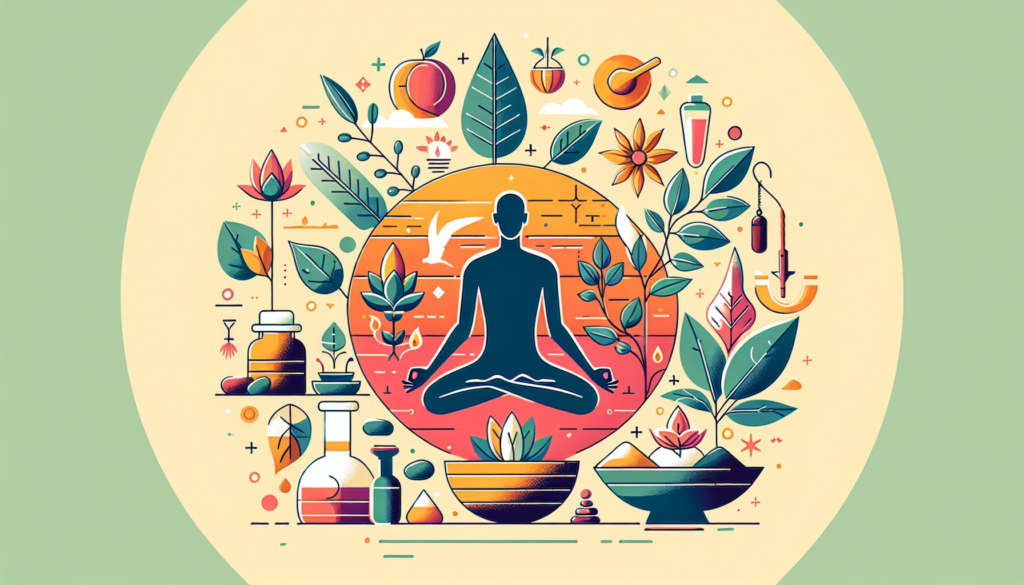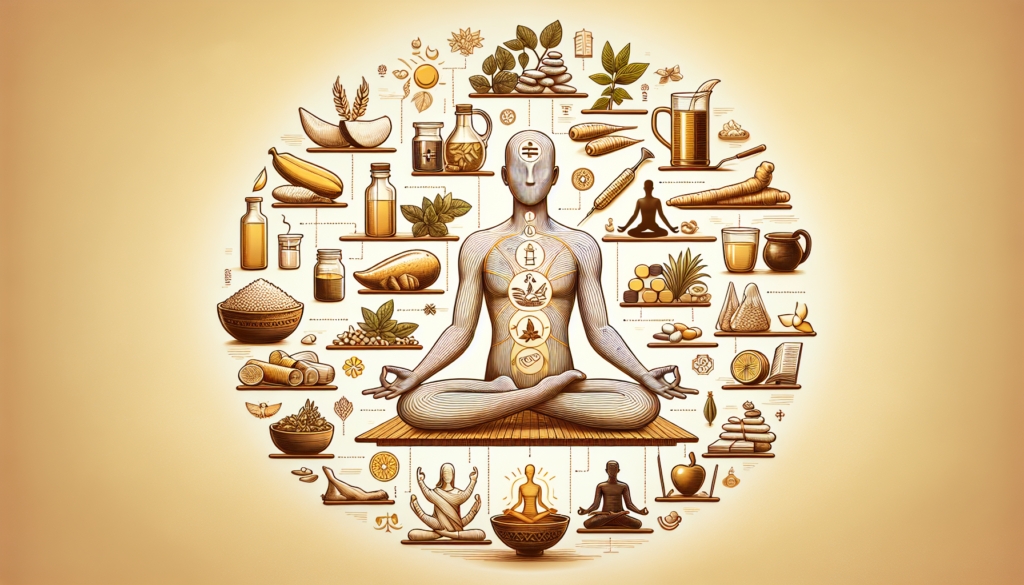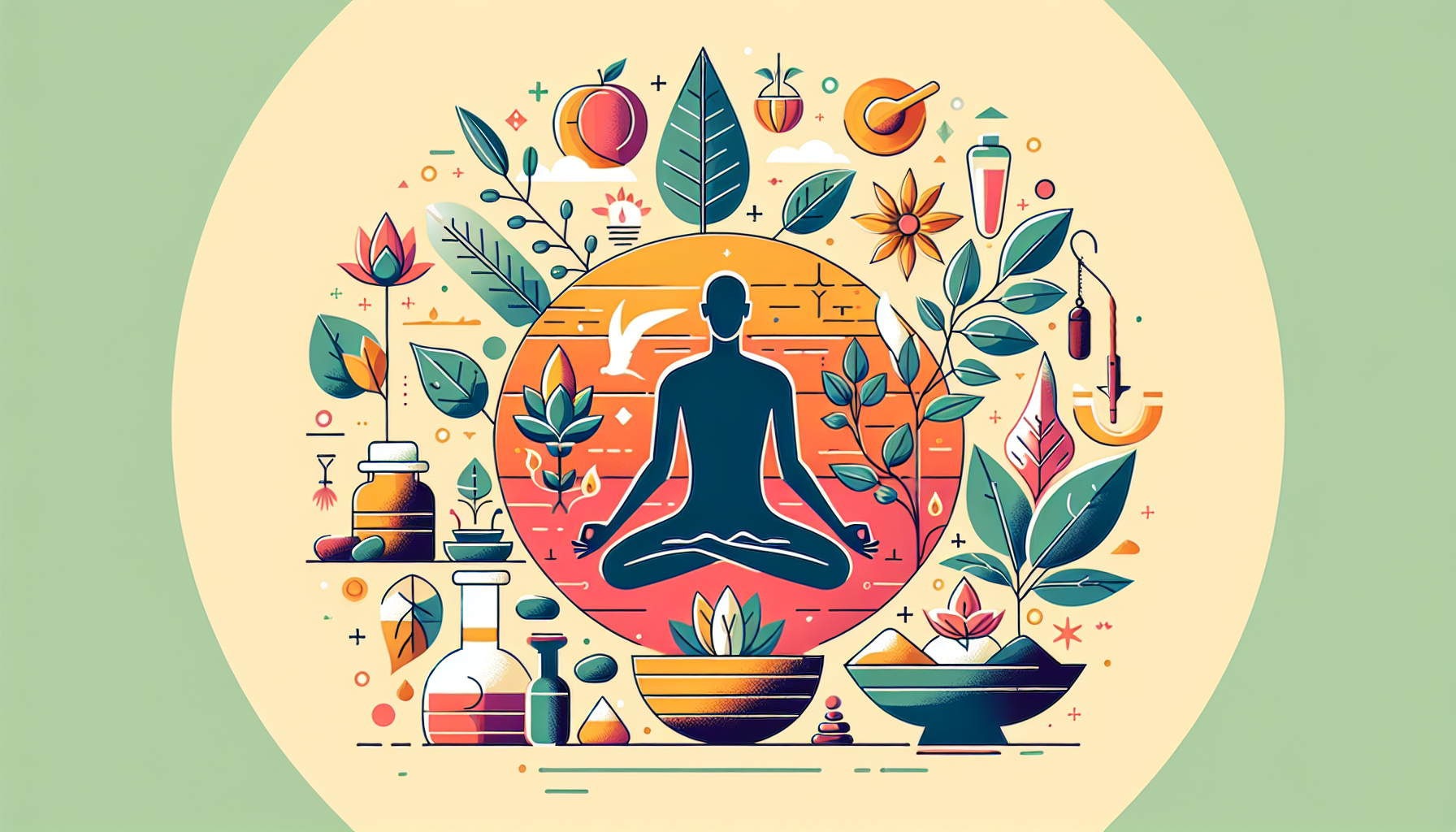In this article, you will discover the profound wisdom of Ayurveda, an ancient healing system that holds the key to a balanced and fulfilling life in the modern world. Drawing upon centuries of knowledge and insights, Ayurveda offers practical guidance on how to nourish your mind, body, and spirit through simple yet powerful practices. From dietary recommendations tailored to your unique constitution to personalized self-care rituals, Ayurveda empowers you to find harmony and vitality in the midst of today’s hectic pace. So, if you’re ready to tap into this ancient wisdom and unlock a healthier, happier you, read on!
Understanding Ayurveda
Ayurveda, an ancient tradition from India, is a holistic system of medicine and healing that has been practiced for thousands of years. It offers a unique perspective on health and well-being, focusing on the balance of mind, body, and spirit. In Ayurveda, every individual is seen as a unique combination of elements, and the goal is to achieve harmony within oneself and with the environment. This article will delve into the various aspects of Ayurveda, including its history, core principles, doshas, balancing techniques, tools and techniques, and its applications in physical health, mental and emotional well-being, beauty care, healthy relationships, daily routine, and harmonious home.
What is Ayurveda?
Ayurveda, which translates to “the science of life,” is a comprehensive system of medicine and healing that originated in ancient India. It is not just a medical system but a way of life, encompassing various aspects of well-being, including diet, lifestyle, exercise, and treatments. Ayurveda views each individual as a unique combination of five elements – space, air, fire, water, and earth – and believes that imbalances in these elements lead to physical, mental, and emotional disorders. The goal of Ayurveda is to restore the balance of these elements and promote overall health and well-being.
History of Ayurveda
The history of Ayurveda dates back over 5,000 years, making it one of the oldest known systems of medicine. It has its roots in the ancient scriptures known as the Vedas, particularly the Atharva Veda. Ayurveda was developed and refined through centuries of observation, experimentation, and the contributions of numerous scholars and practitioners. Its principles and practices have been passed down through generations, and today Ayurveda continues to be a prominent part of Indian culture and healthcare system.

Core principles of Ayurveda
Ayurveda is based on a few core principles that form the foundation of its philosophy:
-
The belief in the interconnectedness of mind, body, and spirit: Ayurveda recognizes that the health of one’s mind and emotions greatly impacts their physical well-being, and vice versa. Thus, it emphasizes the importance of addressing all aspects of a person’s being to achieve holistic health.
-
The concept of individuality: Ayurveda believes that each person is unique and has their own distinct constitution, known as Prakriti. This constitution determines their physical, mental, and emotional characteristics, as well as their susceptibility to certain diseases. In Ayurveda, treatments and recommendations are tailored to an individual’s Prakriti.
-
The focus on balance: Ayurveda places great importance on achieving and maintaining balance, both internally and externally. This balance is achieved through appropriate diet, lifestyle, exercise, and therapies that are specific to a person’s Prakriti and the imbalances they may be experiencing.
-
The power of prevention: Ayurveda emphasizes the importance of preventive healthcare, advocating for a healthy lifestyle and practices that promote wellness. It believes that by addressing imbalances and promoting balance before disease manifests, one can maintain good health and prevent future ailments.
The Three Doshas
In Ayurveda, the balance of the five elements within an individual is determined by three biological forces known as doshas. These doshas – Vata, Pitta, and Kapha – govern all physical, mental, and emotional processes in the body. Understanding the characteristics and tendencies of each dosha is crucial in balancing and maintaining one’s health.
Vata
Vata is the dosha associated with movement and is composed of the elements of space and air. People with a dominant Vata dosha tend to be creative, imaginative, and energetic. When imbalanced, they may experience anxiety, insomnia, and digestive issues. To balance Vata, Ayurveda recommends warming, grounding, and nourishing practices and treatments.
Pitta
Pitta is the dosha associated with transformation and is composed of the elements of fire and water. People with a dominant Pitta dosha are often focused, ambitious, and detail-oriented. When imbalanced, they may exhibit signs of irritability, inflammation, and excessive heat in the body. To balance Pitta, Ayurveda suggests cooling, calming, and soothing practices and treatments.
Kapha
Kapha is the dosha associated with stability and structure, composed of the elements of earth and water. People with a dominant Kapha dosha are often calm, nurturing, and supportive. When imbalanced, they may experience weight gain, sluggishness, and congestion. To balance Kapha, Ayurveda recommends stimulating, invigorating, and energizing practices and treatments.
Balancing the Doshas
Maintaining balance within the doshas is essential for overall health and well-being. Ayurveda provides various methods and practices to balance each dosha and promote harmony in the body, mind, and spirit.
Identifying your dominant dosha
Before attempting to balance the doshas, it is important to identify your dominant dosha or dosha combination. Various factors, such as physical attributes, personality traits, and behavior patterns, can help determine your Prakriti. Consulting with an Ayurvedic practitioner or taking online dosha quizzes can provide valuable insight into your unique constitution.
Methods to balance Vata dosha
To balance Vata, which tends to be cold, dry, and erratic, Ayurveda recommends incorporating warmth, nourishment, and routine into daily life. This can be achieved through practices such as:
- Following a regular routine with set meal times and sleep patterns
- Consuming warm, cooked foods and avoiding cold, raw foods
- Engaging in gentle, grounding exercises such as yoga and tai chi
- Maintaining a warm and cozy environment
- Incorporating warming herbs and spices into the diet, such as ginger and cinnamon
Methods to balance Pitta dosha
To balance Pitta, which tends to be hot, intense, and reactive, Ayurveda suggests cooling and calming practices. Some effective methods for balancing Pitta include:
- Avoiding spicy, greasy, and acidic foods and opting for cooling and hydrating foods
- Engaging in calming activities such as meditation and deep breathing
- Practicing moderation in all aspects of life, including work and exercise
- Creating a peaceful and serene environment
- Incorporating cooling herbs and spices into the diet, such as cilantro and mint
Methods to balance Kapha dosha
To balance Kapha, which tends to be heavy, slow, and stagnant, Ayurveda recommends stimulating and invigorating practices. Some effective methods for balancing Kapha include:
- Engaging in regular exercise, especially activities that get the heart rate up
- Following a light and easily digestible diet, avoiding heavy and oily foods
- Incorporating warmth and spice into the diet, such as ginger and black pepper
- Maintaining an active and dynamic lifestyle
- Creating a vibrant and energetic environment

Ayurvedic Tools and Techniques
Apart from balancing the doshas, Ayurveda also offers various tools and techniques to support overall health and well-being. These tools encompass a wide range of practices, including the use of herbs and herbal remedies, adopting an Ayurvedic diet and nutrition plan, incorporating Ayurvedic massages and oil therapies, and practicing Ayurvedic yoga and meditation.
Herbs and herbal remedies
Ayurveda places great emphasis on the use of herbs and herbal remedies for healing and balancing the body. In Ayurveda, herbs are not only used to treat specific ailments but also to support overall health and prevent imbalances. Popular herbs and spices used in Ayurvedic remedies include turmeric, ashwagandha, triphala, and ginger. These herbs can be consumed in various forms, such as teas, powders, or capsules.
Ayurvedic diet and nutrition
Diet plays a crucial role in Ayurveda, as it is believed that food has the power to either balance or imbalance the doshas. Ayurvedic nutrition involves eating whole, fresh, seasonal, and natural foods that are suitable for one’s unique constitution. This includes incorporating the six tastes – sweet, sour, salty, pungent, bitter, and astringent – in each meal to ensure a balanced diet. Ayurveda also recommends mindful eating, chewing food thoroughly, and avoiding overeating.
Ayurvedic massages and oil therapies
Ayurvedic massages and oil therapies, known as Abhyanga, are an integral part of Ayurvedic healing. These treatments involve the application of warm herbal oils to the body, which not only nourish the skin but also penetrate deep into the tissues and organs, promoting relaxation, detoxification, and rejuvenation. Abhyanga is believed to balance the doshas, improve circulation, promote lymphatic drainage, and enhance overall well-being.
Ayurvedic yoga and meditation
Yoga and meditation have been practiced in conjunction with Ayurveda for centuries, as they both aim to promote balance, harmony, and spiritual growth. Ayurvedic yoga incorporates specific asanas (poses) and pranayama (breathing exercises) designed to balance the doshas and bring about mental, physical, and spiritual alignment. Meditation is also an essential part of Ayurveda, known for its ability to calm the mind, reduce stress, and enhance overall well-being.
Ayurveda for Physical Health
Ayurveda offers a comprehensive approach to physical health, focusing on preventive care, treating common ailments, and addressing chronic diseases.
Preventive healthcare
Ayurveda views prevention as the most effective approach to maintaining good health. By following Ayurvedic principles and practices, such as eating a balanced diet, adopting a healthy lifestyle, engaging in regular exercise, and practicing stress management techniques, one can prevent imbalances and illnesses from occurring. The emphasis is on individualized care, taking into account a person’s unique constitution and addressing their specific needs.
Treating common ailments
Ayurveda provides a wealth of knowledge and remedies for treating common ailments without relying on synthetic drugs or invasive procedures. From digestive issues to respiratory problems, Ayurveda offers a holistic approach to healing the body by addressing the root cause of the ailment and supporting the body’s natural healing abilities. Ayurvedic remedies for common ailments often involve the use of herbs, dietary modifications, lifestyle changes, and specific therapies.
Ayurvedic approach to chronic diseases
Ayurveda also offers an alternative approach to managing chronic diseases such as diabetes, hypertension, and arthritis. The focus is on identifying and addressing the underlying imbalances that contribute to the disease, rather than simply managing symptoms. By adopting an individualized treatment plan that incorporates diet, lifestyle modifications, stress reduction techniques, and specific therapies, Ayurveda aims to restore balance and promote healing in chronic conditions.
Ayurveda for Mental and Emotional Well-being
In addition to physical health, Ayurveda recognizes the importance of mental and emotional well-being. It provides tools and techniques to manage stress, anxiety, depression, and improve sleep quality.
Stress management
Stress is a common ailment of modern living and can have a profound impact on overall health and well-being. Ayurveda offers various stress management techniques, including relaxation exercises, meditation, yoga, and lifestyle modifications. By addressing the root causes of stress and implementing stress-reducing practices, Ayurveda helps restore balance to the nervous system and promotes a sense of calm and tranquility.
Anxiety and depression
Anxiety and depression are increasingly prevalent in today’s society, and Ayurveda offers a holistic approach to managing these conditions. Ayurvedic treatments for anxiety and depression may include a combination of herbal remedies, dietary modifications, lifestyle changes, and specific therapies tailored to an individual’s unique constitution. By addressing imbalances in the mind and body, Ayurveda helps alleviate symptoms and improve overall mental well-being.
Improving sleep quality
Quality sleep is essential for physical and mental health, and Ayurveda provides remedies for improving sleep patterns and addressing sleep disturbances. Ayurvedic recommendations for better sleep often involve establishing a regular sleep routine, creating a calming bedtime ritual, adopting stress reduction techniques, and incorporating specific herbs and practices that promote relaxation and induce restful sleep.
Ayurveda and Beauty Care
Ayurveda values natural beauty and recognizes the importance of inner well-being for outer radiance. It provides principles and practices for skincare, hair care, and natural beauty remedies.
Ayurvedic skincare routines
Ayurveda emphasizes the importance of nourishing and protecting the skin, the body’s largest organ. It recognizes that different skin types require different care, and provides guidelines for skincare routines based on an individual’s unique constitution. Ayurvedic skincare often involves using natural ingredients, such as herbs, oils, and clays, to cleanse, moisturize, and rejuvenate the skin. By promoting the natural balance of the skin, Ayurveda helps maintain a healthy and glowing complexion.
Hair care and scalp treatments
Hair is considered a vital aspect of beauty in Ayurveda, and maintaining healthy hair and scalp is given great importance. Ayurvedic hair care involves using natural oils, herbal hair masks, and scalp treatments to nourish the hair follicles, promote hair growth, and prevent conditions such as dandruff and hair loss. Ayurveda recognizes that hair health is closely linked to overall well-being and provides specific recommendations for hair care based on an individual’s dosha.
Natural beauty remedies
Ayurveda offers a wide range of natural beauty remedies, using ingredients readily available in nature. From face masks and hair treatments to body scrubs and herbal baths, Ayurvedic remedies focus on harnessing the healing power of plants and herbs to enhance natural beauty. These remedies not only promote healthy skin and hair but also nourish the body, mind, and soul, contributing to overall well-being.
Ayurveda for Healthy Relationships
Ayurveda recognizes the impact of relationships on mental, emotional, and physical well-being, and provides guidance on building and maintaining healthy and harmonious relationships.
Understanding relationship dynamics
Ayurveda emphasizes the importance of understanding oneself and one’s partner in relationships. By recognizing and honoring each other’s unique constitutions, communication styles, and needs, individuals can navigate through challenges and build a foundation of trust, respect, and understanding. Ayurvedic principles can help identify areas of imbalance or conflict within a relationship and provide tools for finding harmony.
Improving communication
Effective communication is key to a healthy relationship, and Ayurveda offers insights into communication styles based on dosha dominance. Understanding how each dosha affects communication can help individuals tailor their approach to better connect with their partner. Ayurveda also encourages active listening, empathy, and expressing emotions in a healthy and constructive way, fostering open and honest communication between partners.
Boosting intimacy and connection
Ayurveda recognizes the importance of intimacy and connection in relationships and provides techniques to enhance these aspects. Ayurvedic practices such as Abhyanga (couples massage), sharing meals together, and engaging in activities that promote emotional bonding and trust can deepen intimacy and strengthen the connection between partners.
Ayurveda and Daily Routine
Ayurveda places great importance on daily routines, known as Dinacharya, as they help establish balance and promote overall well-being.
Creating a balanced daily schedule
Ayurveda recommends creating a daily schedule that aligns with the natural rhythms of the body and the environment. This includes waking up early in the morning, following a regular routine for meals and sleep, and incorporating specific practices and rituals that promote balance and harmony. By establishing a balanced daily schedule, individuals can support their body’s natural processes and optimize their overall health and well-being.
Ayurvedic morning rituals
Morning rituals are an essential part of Ayurvedic daily routine and include practices that promote vitality, clarity, and groundedness. Ayurvedic morning rituals often involve tongue scraping, self-massage, oil pulling, meditation, and yoga. These practices help stimulate the body, mind, and senses, preparing individuals for the day ahead and creating a foundation for balance and well-being.
Nighttime routines for better sleep
Ayurveda recognizes the importance of a peaceful and relaxing bedtime routine for quality sleep. Nighttime routines, known as Ratricharya, focus on winding down the body and mind, promoting deep rest and rejuvenation. Ayurvedic nighttime rituals may include practices such as oil massages, warm baths, gentle stretching, meditation, and avoiding stimulating activities and electronic devices. By incorporating these rituals into the nighttime routine, individuals can improve sleep quality and support overall well-being.
Ayurvedic Practices for a Harmonious Home
Ayurveda extends its principles to the home environment, recognizing the impact of the living space on overall well-being. Creating a harmonious home involves incorporating concepts from Vastu Shastra – the Indian science of architecture – and Feng Shui.
Vastu Shastra – the Indian science of architecture
Vastu Shastra is an ancient Indian science that guides the design and layout of homes and buildings to promote harmony and positive energy flow. It encompasses principles related to the orientation, placement of rooms, furniture arrangement, and use of colors and materials. By following Vastu Shastra principles, individuals can create a home that supports balance, health, and prosperity.
Feng Shui and Ayurveda
Feng Shui, a Chinese system of harmonizing energy in the environment, aligns well with Ayurvedic principles. By incorporating elements of Feng Shui, such as decluttering, balancing the five elements, and enhancing the flow of Qi (energy), individuals can create a home that promotes balance, peace, and well-being. Ayurveda and Feng Shui together offer a comprehensive approach to creating a harmonious living space.
Creating a soothing living space
Ayurveda emphasizes the importance of creating a soothing and nurturing environment that supports relaxation, rejuvenation, and overall well-being. This can be achieved by incorporating elements such as natural light, calming colors, comfortable furniture, soft textures, and inspiring artwork. Ayurvedic principles also suggest the use of natural materials, plants, and essential oils to purify the air and create a peaceful atmosphere.
In conclusion, Ayurveda offers a comprehensive approach to health and well-being, encompassing various aspects of life. From understanding the doshas and balancing them to incorporating Ayurvedic tools and techniques into daily life, Ayurveda provides a holistic framework for achieving harmony within oneself and with the world around. By embracing the ancient wisdom of Ayurveda, individuals can experience improved physical health, mental and emotional well-being, enhanced beauty, healthier relationships, balanced daily routines, and a harmonious living space – ultimately embodying ancient wisdom for modern living.

